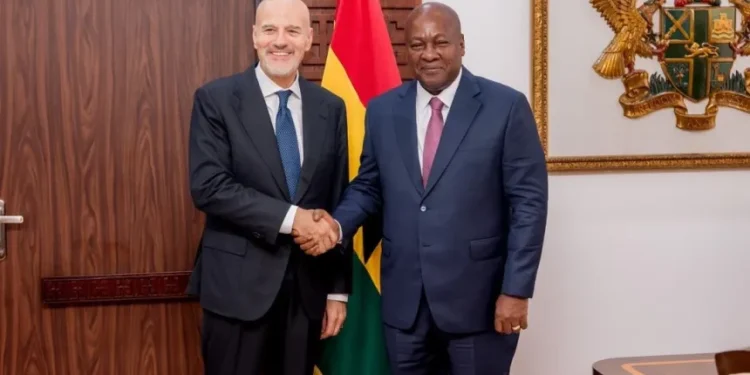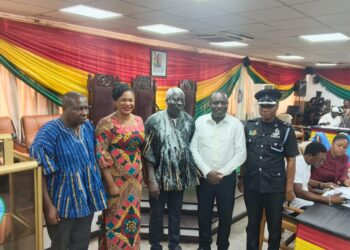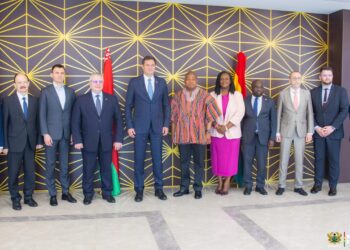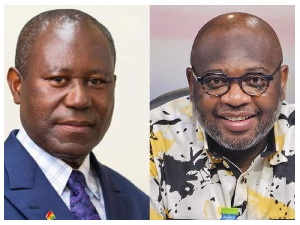The Herald has gathered reports, indicating that the Mahama government, has asked for the withdrawal of the proposed unitisation between Eni’s Sankofa Gye Nyame (SGN) Field and Springfield’s West Cape Three Points (WCTP) Afina discovery, and it is to happen by the end of this week.
This development, follows a meeting between President John Dramani Mahama and Eni’s Chief Executive Officer, Claudio Descalzi, in Accra on Friday to discuss the country’s oil and gas industry.
Reports suggest that, the directive for the withdrawal was issued long before last Friday’s meeting, though the Energy Ministry, has reportedly delayed implementing it.
The decision to withdraw the unitization, is aimed at encouraging Eni, which had shifted its operations to neighbouring Cote d’Ivoire, to fully resume activities in Ghana, following the exit of the Akufo-Addo administration.
The Herald understands that a firm directive has been issued from the Presidency to the Minister of Energy, John Jinapor, to withdraw the unitisation order issued by the previous government.
This order had been the subject of a legal dispute between Eni Ghana Exploration and Production Ltd and Springfield Exploration & Production Ltd since 2020.
Over the weekend, The Herald learned that the Energy Ministry, the Attorney General, and the Minister of Justice, Dr Dominic Ayine, have been discussing President Mahama’s stance on the withdrawal directive.
The Energy Ministry and the Attorney General’s office, led by Dr Dominic Ayine, have deliberated on the language of the withdrawal directive. Former Energy Minister John Peter Amewu initially issued this directive, which was widely perceived to favour Springfield Exploration & Production Ltd. The debate also centred on which ministry should issue the new directive.
It has now been decided that the Energy Ministry will issue the new directive, with Mr. Jinapor expected to execute it by the end of the week.
At the meeting with President Mahama, Mr Descalzi highlighted the successes of the Offshore Cape Three Points project (OCTP), which he described as the most significant private investment in Ghana’s oil sector.
The project was completed ahead of schedule and under budget, with the first oil in 2017 and the first gas in 2018. Gas from the OCTP project is fully allocated for Ghana’s domestic consumption, ensuring a stable and reliable energy supply and contributing approximately 70% of Ghana’s domestic gas production.
Additionally, Eni has brought to President Mahama’s attention new short and medium-term exploration and development opportunities. The meeting also provided an opportunity to discuss Eni’s broader economic diversification plans in Ghana.
Eni has been operating in Ghana since 2009. It holds a 44.4% stake in the OCTP project, partnering with Vitol (35.6%) and Ghana National Petroleum Corporation (20%). Its projects also include initiatives in training, economic diversification, access to water and sanitation, and energy accessibility.
In August last year, employees of Eni Ghana Exploration and Production Ltd expressed concerns over the unitisation of the Afina discovery and the Sankofa field. The General Transport, Petroleum, and Chemical Workers Union petitioned the then Minister of Energy, stating, “We have observed with grave concern that the State’s failure to resolve this issue and bring a decisive conclusion to the matter has significantly impacted the investment climate of the OCTP Project, including the general upstream business environment, resulting in potential job losses for our members.”
The Union, which has been closely following the unitisation directives and subsequent legal proceedings initiated by Springfield against Eni and Vitol, has been critical of the Akufo-Addo government’s handling of the issue. It has called for the withdrawal of the unitisation directive following a ruling by the International Arbitral Tribunal under the Stockholm Chamber of Commerce on July 8, 2024.
According to the Union, “This Award determined that Ghana breached its laws and the OCTP Petroleum Agreement by issuing the directive for the unitisation of the Afina discovery and Sankofa field.”
The petition, dated August 8, 2024, urged the Energy Minister to act swiftly: “We respectfully request that your good self intervene in this matter as a matter of urgency by retracting the directives regarding the Unitization Directives until all the parameters for unitization are fulfilled.”
The General Secretary of the Union, Fuseini Iddrisu, emphasized that withdrawing the directives would help restore investor confidence, prevent job losses, and encourage continued investment in Ghana’s oil sector.
In 2021, Ghana’s Attorney General and Minister of Justice were formally notified of arbitration proceedings initiated by Eni and Vitol under the United Nations Commission on International Trade Law (UNCITRAL). The arbitration hearing took place in August 2023, and on July 8, 2024, the Arbitral Tribunal ruled in favour of Eni and Vitol, affirming their opposition to the unitisation directives.
The Tribunal found that the directives were unlawful and in violation of Ghanaian law and the OCTP Petroleum Agreement.
Key findings included:
· The directives did not align with Ghana’s legal framework and the Petroleum Act.
· Essential elements required for unitisation, such as dynamic communication and a straddling accumulation, were not established.
· The imposed unitisation terms violated procedural and substantive legal requirements.
· The technical evaluation used to justify unitisation was flawed.
· The allocation of tract participation percentages was erroneous.
Furthermore, the Tribunal preserved Eni/Vitol’s right to claim damages if the unitisation directives were enforced, stating that Ghana would be liable for full damages should it proceed with enforcement.
The continued imposition of the unitisation directive has had significant negative impacts on Ghana’s investment climate, oil production, and employment. Since 2017, no new oil and gas field developments have occurred. The delay in signing petroleum agreements from the 2019 licensing round has contributed to declining production rates in existing fields such as Jubilee, TEN, and Sankofa.
The OCTP project, initially expected to produce 40,000 barrels per day, has seen output drop to approximately 23,000 barrels per day due to a lack of investment. This decline has also affected state revenue, with the Ghana National Petroleum Corporation (GNPC) expected to lift fewer oil cargoes in 2024 compared to previous years.
Additionally, Eni Ghana and its partners contribute significantly to Ghana’s economy through taxes, salaries, and job creation. The OCTP project supports more than 2,000 direct and indirect jobs. However, the ongoing legal and investment uncertainties threaten these jobs and the overall stability of the sector.
As Ghana moves towards resolving this longstanding dispute, the withdrawal of the unitisation directive is expected to restore investor confidence, encourage further investments, and safeguard jobs in the oil sector.
The Energy Ministry’s anticipated directive, will also be crucial in setting the stage for a renewed partnership with Eni and its partners to ensure the sustainable development of Ghana’s petroleum resources.
Source: TheHeraldghana










Discussion about this post